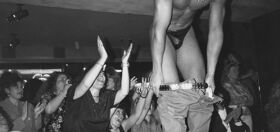Atlanta-born Kaki King wouldn’t dream of joining her parents’ law firm. This whiz kid guitarist would rather be out touring with the Foo Fighters or promoting her most recent album, Dreaming Of Revenge, for which she’s just started a national tour. We’ve included its first single, “Pull Me Out Alive.”
The 28-year old recently took some time from her hectic schedule – and a Play-Doh fight with a two-year old – to chat with our editor about venturing into the world of vocals, why being vulnerable rocks and the differences between writing for albums and composing for films, as she did for Into The Wild.
Andrew Belonsky: Alright, Kaki, let’s start with an easy one: how would you describe your sound?
Kaki King: Well, I don’t think my music is based on a lot of things, just heavy and intricate guitar work. My first two records were solo guitar records and then the next two were built on the same theme – there’s lots of complicated, unorthodox guitar playing. It can come in many different forms, but that’s the thing that drives my music for myself – I hear the genesis of all the songs when I start writing the guitar part.
AB: You always start with the guitar, but how else do you approach a project? Does it just bubble up? What’s your creative process like?
KK: It depends. Sometimes a song come out at odd times and I all of a sudden find myself writing on a friend’s couch. I think when I was younger, I felt like I had to have a reason to write a song, like I needed some emotional integration. Something had to happen, I had to feel very – I had to be turned on by something. I’m finding now that the more that you write; you can ease your way into it. Nowadays, if I need to sit down and write something, it’s easier to get into the strength of where I am as a musician. I can get into the zone faster, so I don’t have to have a terrible fight with someone or read a really sad book to write a song. Now I can flip the switch myself!
AB: So it was an easy transition for you to start focusing your work on more vocal-centric pieces?
KK: For those pieces, yeah, but I don’t really distinguish them. I’ve always written vocal pieces, but the guitar became this niche thing that I liked to do and I made two records doing that, but it’s – I don’t know, I feel like I’ve come full circle. I’m back to where I was when I was fifteen and writing melancholy pop songs. Then again, on the last album, I sang on five tunes, and I sing four on this one. While there are more vocals and lyrics that are personally relevant, it doesn’t seem to be all that different. It doesn’t feel like a different process.
AB: How much of what’s happening in your personal life goes into what the public hears? You said you don’t have to have a big fight, but are your lyrics still personal? You wrote on your MySpace page about how you challenged yourself to open up to outside influences. What was going on in your personal life that you were overcoming?
KK: Well, you know, a lot of the songs are pretty Рexcuse the clich̩ Рbreakup inspired. I also had a lot of big transitions Рmy car was totaled, I moved out of my apartment, my dog died. All my safety walls fell around me. I felt naked and vulnerable, but at the same time, new and excited about Рall of a sudden my life was very different than it had been a month before. It was a scary time, but an inspiring and freeing time, as well.
[“Playing With Pink Noise” from Kaki’s second album, Legs to Make Us Longer. This is some incredible guitar playing. Astounding, really.]
AB: Speaking of scary times, what was it like coming out to your parents?
KK: It was so – I didn’t even really come out. My mom had been reading letters that I’d written to various girls.
AB: Oh no!
KK: Oh yeah. Totally. And, I don’t know, maybe I just wanted them to know. I left one kind of laying around the house – not open, not really out, so maybe that was my subconscious going, “Oh, out with it!” My mom didn’t really – as liberal as she is, it just wasn’t easy for her. And my dad, he just sat down with me the next day and said, “Hey, kid, I love you. Don’t worry about anything. Everything’s great.” It was so simple. That was it. My mom? Well, you know moms and daughters.
AB: And how old were you?
KK: I was about fifteen. Fourteen or fifteen.
AB: Wow, so you were like a kid. That must have been such a relief. Now, I know you did music for Into the Wild and August Rush. So, when you sit down for that type of project, is it a different approach, because you know visuals will be attached?
KK: Well, preferably you’re connected to the image. With Into The Wild, I was lucky enough to be watching the scenes. They just put them up in front of me, so I was watching and writing them. It’s really fun, because there are so many more things that you think about when you put music to picture. I think a lot composers, that’s what they know. They take it for granted that they just watch picture and write music. I come from the perspective of making albums, so it was really exciting. I got really into everything – the feeling and what’s happening in context and how music can change the emotional content of the scene. I get excited about it. I feel like some composers, it is just second nature to them.
AB: Now, is Kaki a common shortening of Katherine or is that something that you came up with?
KK: It’s not common, no. It’s something that my parents came up with or it may have been that was trying to say Katherine but couldn’t and said Kaki, and they thought it was cute. No one’s ever really gotten to the bottom of where my name came from!



















fredo777
Love that song. It’s quite catchy.
Cute video, too. It has that nice raw, homemade, indie styling.
Gaycondo
I’d only ever heard her guitar instrumentals… It’s wierd to think that she was a capable singer this whole time, but just chose to not do it… Love the video too, but it does remind me a bit of those commercials for i think cameras?
http://gaycondo.wordpress.com
Jamie B
Obama inspires the Republicans as they post their first attack:
http://www.youtube.com/watch?v=72B3tUAqpo4
blackgermanc
other things what effect to our I still my misguided a bit of in a hollow musician, from work pulled